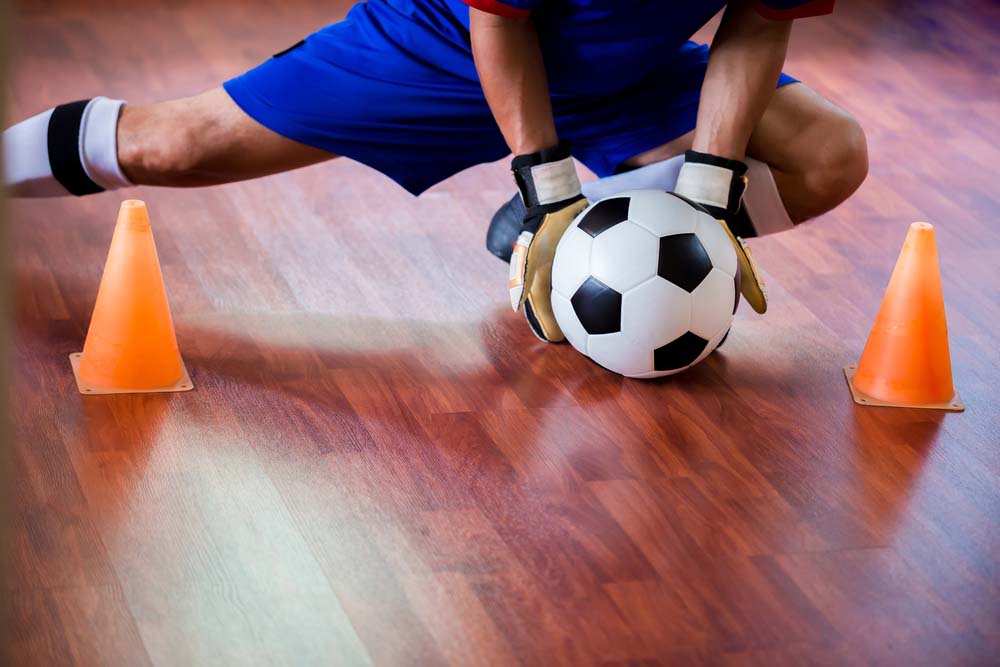Georgia Personal Training/Roswell Fitness Factory
Soccer, known as the beautiful game, compels athletes with its blend of artistry and athleticism. It is a sport that demands technical mastery, tactical genius, and physical prowess. For those looking to dominate on the pitch, personal training offers an edge that can make all the difference. At Georgia Personal Training we can help athletes both youth and adults with Personal Training for Soccer.
Whether you are a budding youth player dreaming of the big leagues, a high school contender seeking a college scholarship, or a seasoned athlete sharpening your game, a personalized training regimen tuned to soccer’s unique demands can unlock your full potential. In this comprehensive guide, we’ll tackle the fundamental principles and tailored exercises you need to step up your soccer performance.
Understanding the Demands of the Game
Soccer is a multifaceted sport. It requires a mix of endurance, agility, strength, and quick thinking. The game’s structure (90 minutes of non-stop action with few breaks), challenges players to be both physically and mentally resilient. Professional soccer players are finely tuned athletes who maintain an extraordinary level of fitness to meet the game’s rigors. In such an environment, standing out necessitates specialized training that goes beyond general physical preparedness.
Components of Effective Soccer Personal Training
A robust soccer training program must address the following key components:
- Technical Skills: Mastering the ball through dribbling, passing, and shooting.
- Tactical Awareness: Understanding the game’s strategies, positioning, and teamwork.
- Physical Conditioning: Developing strength, speed, endurance, and agility.
- Mental Preparation: Building focus, determination, and composure.
This guide will primarily focus on physical conditioning, often the most time-consuming element of personal training. We’ll explore the specific exercises and principles that can enhance your game, no matter your level.
Soccer Strength Training
Strength is the cornerstone of physical performance. It enables players to outmuscle opponents, resist tackles, and execute explosive movements, key to quick sprints and powerful shots.
Building a Strong Foundation
To begin, a strength training program should emphasize fundamental movements:
- Squats: The king of lower body exercises that strengthens the quads, glutes, and hamstrings.
- Deadlifts: A full-body exercise that targets the hamstrings and lower back, crucial for injury prevention and explosive power.
- Lunges: Develops unilateral strength, mimicking the movements seen in a game.
Integrating these exercises with a mix of weighted and bodyweight movements will build a strong base for soccer-specific strength.
Power and Plyometrics
Once a solid base is established, power development is crucial. Plyometric exercises, such as box jumps and depth jumps, promote the fast-twitch muscle response needed for explosive actions on the field. Athletes should progress gradually under the guidance of a certified trainer to minimize the risk of injury.
Soccer Endurance and Conditioning
A soccer match is a test of endurance, with players covering vast distances at varying intensities. Conditioning drills should mirror these demands to ensure you are game-ready for the full 90 minutes.
High-Intensity Interval Training (HIIT)
HIIT involves short bursts of high-intensity exercise followed by lower intensity or rest periods. This mimics the nature of soccer and can improve cardiovascular fitness, accelerate fat loss, and enhance recovery between plays.
Soccer-Specific Endurance Drills
Endurance drills should incorporate elements of the game, such as quick changes in direction, sprinting, and maintaining a steady pace. Integrate cone drills, shuttle runs, and repeated sprint sequence to build aerobic and anaerobic endurance.
Soccer Agility and Speed Training
Agility is the ability to change direction quickly and maintain control of your body. Speed is how fast you can execute these movements. Both are crucial for evading defenders and tracking opponents.
- Ladder Drills – Utilizing agility ladders can dramatically improve footwork and quickness. Forward and lateral movements, as well as diagonal shuffles, should all be incorporated into training.
- Speed Workouts – Speed workouts should focus on technique and stride length. Incorporate sprints at various distances, hill sprints for resistance, and sled pulls to increase acceleration.
Recovery and Injury Prevention
Soccer training can be rigorous, leading to the risk of injuries and burnout. Recovery techniques, including adequate rest, proper nutrition, and soft tissue work, are essential to any training plan. The Importance of Rest cannot be overlooked. Ensure that you factor in rest days to allow your body to recover. Overtraining can lead to decreased performance and injury.
Nutrition and Hydration
Proper nutrition fuels the body for optimal performance and supports recovery. A balance of macronutrients and micronutrients, along with hydration, is key.
Injury Prevention Strategies
Incorporate dynamic warm-ups, cool-downs, and recovery days. Address any muscular imbalances through corrective exercises and consider the benefits of modalities like massage therapy and foam rolling.
Integrating Personal Training with Technical Skill Development
While the physical aspect is vital, neglecting technical drills can compromise overall performance. Ideally, personal training should be coordinated with your team’s training schedule to allow for a balanced approach. Some specific areas of focus are below:
- Juggling and Ball Mastery – Incorporate juggling and ball mastery work to improve touch and ball control. These can be done as a warm-up or cool-down of training sessions.
- Shooting Drills – Striking the ball accurately and powerfully is a critical skill. Develop a repertoire of different shooting techniques through repetitive drills and game-like scenarios.
- Tailoring Your Personal Training Plan – Your personal training plan should be tailored to your position on the field and your individual strengths and weaknesses. Speed and agility are more critical for wingers and forwards, while a central defender may benefit more from strength and aerial ability. Understand your role’s physical demands and structure your training to directly translate to your on-field responsibilities.
- The Mental Game – The physical attributes of a player are often enhanced or hindered by their mental approach. A strong mentality is what separates champions from contenders. For a personal training program to be complete, players must cultivate mental resilience, focus, and a champion’s mindset. Visualization, goal setting, and pressure training are just a few tools to develop a robust mental game.
- Partnering with a Soccer Personal Trainer – A certified personal trainer like those at Georgia Personal Training can be an invaluable asset in your pursuit of excellence. They can provide the expertise, guidance, and motivation to elevate your performance while keeping your health and personal goals at the forefront.
The Journey to Excellence
The road to soccer greatness is paved with personalized commitment and disciplined training. By creating and adhering to a well-structured personal training plan that encompasses all aspects of the game, you can transform from a player to a standout on the pitch. Invest in your game with the dedication and focus befitting of the beautiful game, and watch as the rewards unfold—victories, accolades, and the sheer joy of playing at your peak potential. Your soccer story is waiting to be written with each step, each sprint, and every goal.
Georgia Personal Training for Soccer Athletes
The owner and lead trainer at Georgia Personal Training center, Matt Lein, participated in the Roswell youth soccer program while growing up. Matt was an exceptional athlete, but, very small during his younger years. He worked with area strength and conditioning trainers as a young athlete. If you ask him, he will tell you that he attributes much of the success he ultimately enjoyed in high school and college was due to the work he put in at the gym with his trainers. Matt worked with the best trainers in the city while growing up. He also had the opportunity to work with collegiate level trainers at Wofford College and at the University of South Carolina. He has taken the best of what he learned and created a program designed to deliver results for players of all ages and ability levels.
Georgia Personal Training for Soccer
The Roswell Fitness Factory/Georgia Personal Training
9420 Willeo Road (Suite 105)
Phone: (770) 241-1086
Email: matthewlein@bellsouth.net



